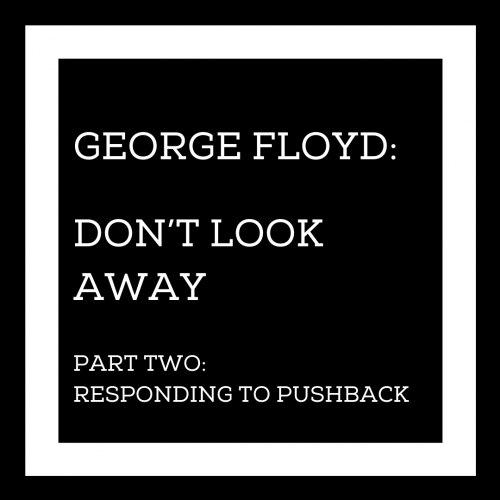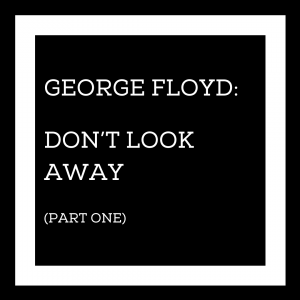George Floyd: Don’t Look Away (Part Two)

Responding to Pushback
By Heather Iliff, President & CEO, and Carmen Marshall, Director of Consulting
Racism in America is like a big nasty open wound, rampant with infection, that cannot seem to heal and appears to be killing the patient. We must not let that happen. Though racism in all its forms of oppressive systems gives advantage and privilege to some and kills others, it ultimately hurts all of us. Like the heart and lungs of the patient, all of us – including Maryland Nonprofits members – are interdependent. Therefore, we must take a righteous stand together. Brave souls of every generation have drawn criticism, fire, and debate while taking a stand on civil rights, racial equity, justice and freedom. Fannie Lou Hamer, Dr. Martin Luther King, Malcolm X, Congressman Elijah Cummings, and so many others come to mind. Standing up and speaking up are imperative, but when you do, be prepared for the pushback.
Many of our organizations are making statements regarding George Floyd’s murder. Pushback on our statements is inevitable as our entire society enters into a new level of dialogue about systemic racism. We would like to share feedback we received from one of our members in response to our statement, “George Floyd: Don’t Look Away”, as well as our reply. Maryland Nonprofits is on its own journey of strengthening our attention to justice, equity, diversity, and inclusion, and we acknowledge we have more work to do. We found this exercise of responding to pushback to be helpful to as we do this work.
Feedback Received:
“Perhaps we should allow the judicial process to occur to determine guilt and determine if this is “murder”. What happened to due process?
Let’s stop calling this murder and instead demand that police departments be accountable for their actions. Then add to the mix the number of white people who are being murdered by black people. Check those statistics. It is extremely alarming.
This dialogue should be complete and not one-sided, prejudicial, and biased with a determination prior to process.”
Our Response:
“Thanks so much for your feedback, and I appreciate your perspective. You are right that the case has not been adjudicated as a “murder” in our legal system. We have chosen to use the language of the oppressed, the language of the observer, in this instance rather than the language of a legal system that has failed to hold hardly any police accountable in the long history of cases like this. It is the lack of justice and accountability that is underpinning the outrage, not just the act of killing George Floyd itself. It is the commission of this act in an environment of impunity that has gone on too long. We do not see any need to “add to the mix” the issue of White people being killed by Black people. That is a false equivalency and if we were dealing with a video of a Black police officer killing a white person, we would be having a different conversation altogether.
Maryland Nonprofits is not organizing a dialogue about whether there is or isn’t structural racism that needs to be dismantled in America. We are organizing a dialogue for people who want to understand what systemic racism is, how it works and is perpetuated, and figure out what can be done about it. I think people who want to argue that this is not the main issue will need to find a different forum other than Maryland Nonprofits for that conversation. Yes, we are taking sides, the side of Black people who have been oppressed too long and it has to stop. People in power and authority have had the entire legal, justice and economic system on their side for centuries. We do not feel it is consistent with our goals and values at this time to give people a platform to argue that systemic racism is not the real issue.
I send this to you with utmost respect for you, your opinion, the important work you do, and I appreciate our ability to disagree civilly on issues of the day.”
Reflections on Responding to Pushback
-
- There is a difference between pushback and trolling. Pushback (or resistance) is feedback that is substantive and specific. Trolling is name-calling, baiting, and hateful. Responding to pushback can be helpful to you and your stakeholders in advancing the learning and change process. Responding to trolling only fuels the fire of hate and should be avoided.
2. Pushback is almost inevitable if you are truly leaning into racial equity work with an aim to change things. Have discussions with your board and staff about being ready for pushback – what it might look like and how you would respond. For example, are you okay if board or staff members who are not interested in your race-equity agenda resign? What about lost donors? Are you ready for the consequences of taking a stand? Having the board behind you is a real confidence booster in responding to pushback.
3. The status quo is there for a reason, and resistance to change is part of the change process itself. Addressing resistance helps you clarify the change you are seeking. Writing our response above helped us clarify our meaning and stand tall in our conviction.
4. If the pushback is internal – from your staff or board members – a simple written response is not sufficient. Internal pushback is a sign that your organization needs deeper work in racial equity and bringing in an outside facilitator is recommended.
5. Don’t throw people away. It can be tempting to dismiss people who are not as far along in their journey, but we owe it to people who take the time to raise their concerns to acknowledge their perspective and lived experience. Note in the above that we started and ended our response to the pushback with respect and an acknowledgment of the experience and perspective of the writer.
Following our correspondence with this person, they got back to us with a note of thanks and acknowledgment of the importance of dialogue. This was very welcome but unexpected, and not all cases will turn out like that. What is important is we know our board and staff are united in this work for racial equity and we will continue to explore what that means for the actions we take.
Maryland Nonprofits provides consulting and training programs for nonprofit organizations interested in strengthening their commitment to Justice, Equity, Diversity, and Inclusion. Contact Carmen Marshall at cmarshall@mdnonprofit.org for more information.
Read Part One:

